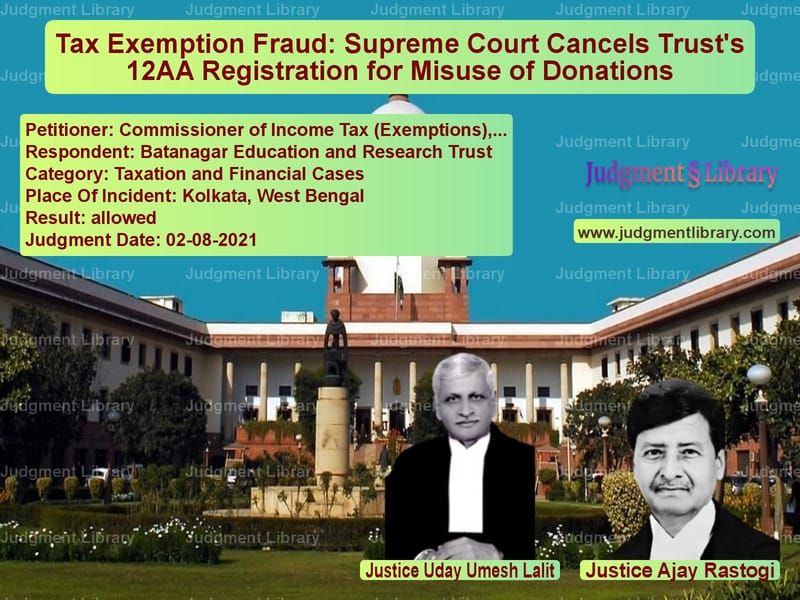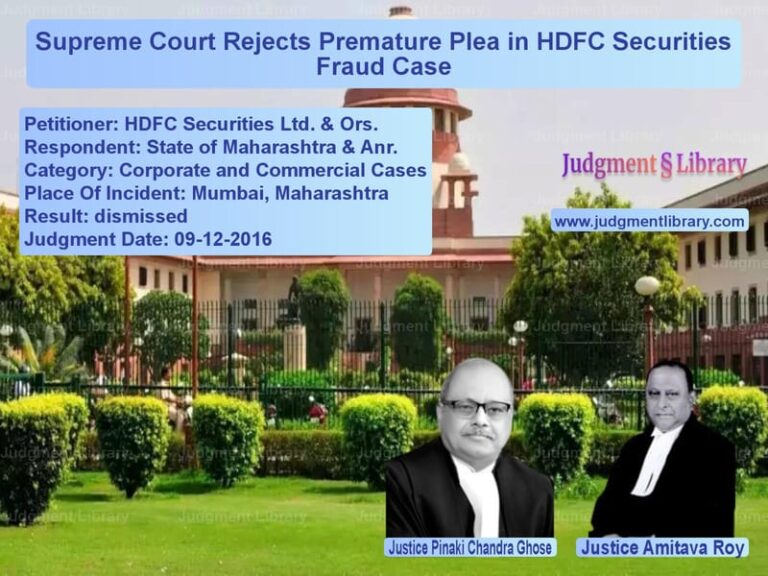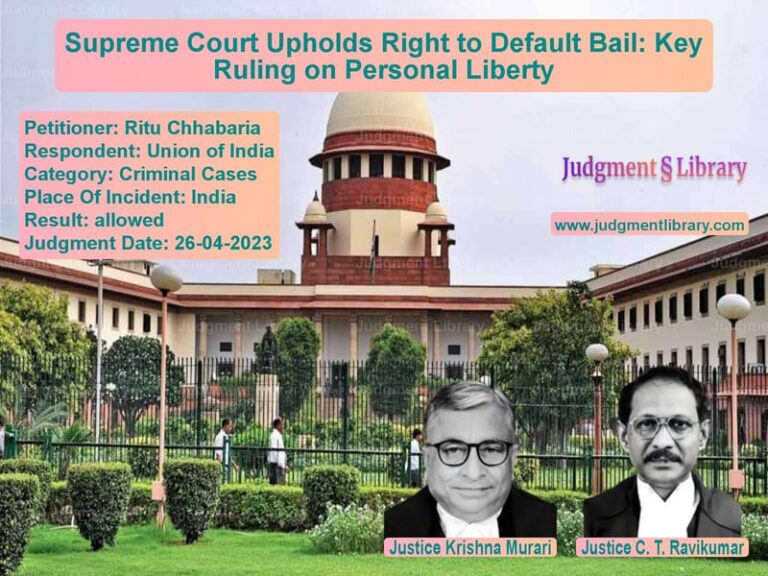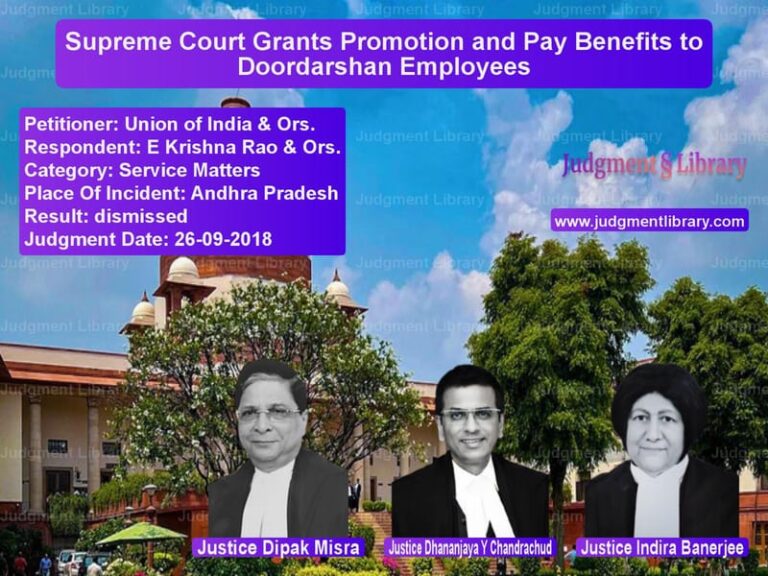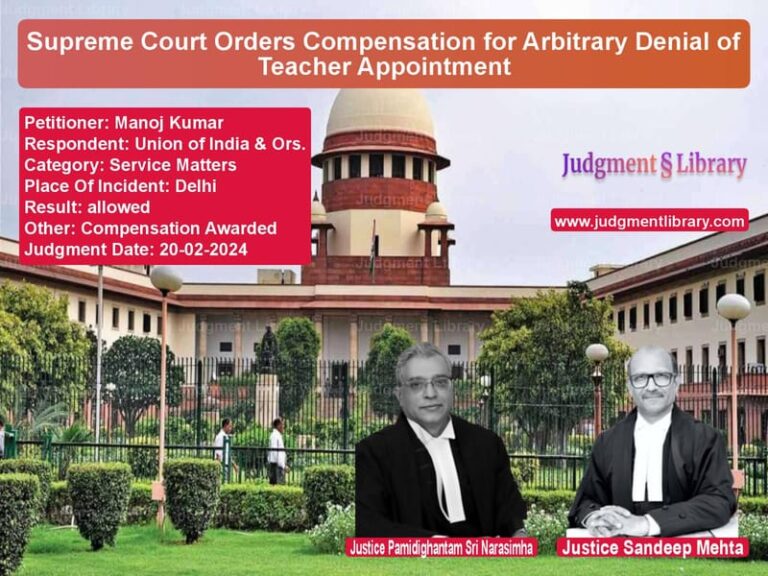Tax Exemption Fraud: Supreme Court Cancels Trust’s 12AA Registration for Misuse of Donations
The case of Commissioner of Income Tax (Exemptions), Kolkata v. Batanagar Education and Research Trust is a landmark ruling concerning the misuse of tax exemptions granted under Section 12AA of the Income Tax Act, 1961. The Supreme Court of India found that the trust had engaged in fraudulent financial practices, including accepting bogus donations and returning them in cash, leading to the cancellation of its tax-exempt status.
Background of the Case
The respondent, Batanagar Education and Research Trust, was granted registration under Section 12AA of the Income Tax Act on 06.08.2010. This registration allowed the trust to claim tax exemptions and also receive donations that were eligible for deductions under Section 80G of the Act. However, during a survey conducted on another entity, the School of Human Genetics and Population Health, the Income Tax Department discovered irregularities involving bogus donations linked to the trust.
Based on the findings of the survey, the Commissioner of Income Tax (CIT) issued a show cause notice on 04.12.2015, questioning the genuineness of the trust’s activities and its compliance with the objectives outlined in its registration.
Petitioner’s Arguments
The Commissioner of Income Tax (Exemptions) argued that:
- The trust was not carrying out charitable activities as claimed but was instead engaging in financial mismanagement.
- A significant portion of the donations received were not genuine and were merely accommodation entries used to facilitate money laundering.
- The trust admitted that substantial amounts of donation money were returned to donors through intermediaries, effectively making them bogus transactions.
- Such practices violated the conditions for tax exemption, and thus, the trust’s registration under Section 12AA should be canceled.
Respondent’s Defense
The Batanagar Education and Research Trust defended itself by stating that:
- It had received donations from various donors and was not responsible for verifying the sources of those funds.
- All funds received were used for the stated objectives of the trust.
- The Income Tax Department had failed to prove that the trust was involved in illegal activities.
- The cancellation of its tax-exempt status was excessive and unjustified.
Findings of the Income Tax Department
During the investigation, the trust’s managing trustee, Shri Rabindranath Lahiri, admitted that a major part of the donations received in the financial years 2011-12 and 2012-13 were not genuine. Key revelations included:
- The donations were shown as corpus donations but were, in reality, accommodation entries.
- Funds were returned to donors through intermediaries.
- Names of seven shell companies were provided, which acted as intermediaries for money laundering.
- Donations received through cheques were returned in cash to the respective donors.
The CIT concluded that:
- The trust had grossly misused its tax-exempt status.
- The receipt of bogus donations and subsequent money laundering were clear violations of Section 12AA.
- The trust’s activities were not genuine and were not being carried out in accordance with its declared objectives.
- The trust had engaged in hawala transactions.
Decision of the Income Tax Appellate Tribunal
The trust appealed the CIT’s decision before the Income Tax Appellate Tribunal (ITAT). However, the ITAT upheld the cancellation of the trust’s registration, agreeing with the findings of the CIT.
The ITAT observed that:
- The trust was engaged in financial fraud by routing money through bogus transactions.
- The misuse of donations amounted to a violation of the objectives of the trust.
- The registration granted under Section 12AA was being misused for tax evasion.
High Court’s Decision
The trust then filed an appeal before the Calcutta High Court, which ruled in favor of the trust. The High Court set aside the cancellation order and directed the reinstatement of the trust’s registration.
The High Court reasoned that:
- The Income Tax Department had not established that the trust was involved in illegal activities.
- The trust could not be held responsible for verifying the source of its donations.
- There was no evidence that the funds received were misused for non-charitable purposes.
Supreme Court’s Ruling
The Commissioner of Income Tax (Exemptions) challenged the High Court’s ruling before the Supreme Court. The Supreme Court overturned the High Court’s decision and reinstated the cancellation of the trust’s registration.
The Court held that:
- The trust had engaged in fraudulent financial practices by receiving bogus donations and returning the money in cash.
- The activities of the trust were not genuine and were in direct violation of Section 12AA.
- An entity that misuses its tax-exempt status is not entitled to retain such status.
- The High Court had erred in failing to consider the overwhelming evidence of fraud and money laundering.
Key Observations from the Judgment
The Supreme Court observed:
“The answers given to the questionnaire by the Managing Trustee of the Trust show the extent of misuse of the status enjoyed by the Trust by virtue of registration under Section 12AA of the Act. These answers also show that donations were received by way of cheques, out of which substantial money was ploughed back or returned to the donors in cash. The facts clearly show that those were bogus donations.”
Further, the Court stated:
“An entity which is misusing the status conferred upon it by Section 12AA of the Act is not entitled to retain and enjoy said status.”
Final Judgment
The Supreme Court allowed the appeal, ruling that:
- The order of the High Court was set aside.
- The cancellation of the trust’s registration under Section 12AA was reinstated.
- The trust was no longer eligible for tax exemptions or benefits under Section 80G.
Impact of the Judgment
This ruling sets a strong precedent for the regulation of charitable trusts and tax-exempt entities in India. Key takeaways include:
- Trusts engaged in financial fraud cannot claim protection under tax exemption laws.
- Registrations under Section 12AA can be revoked if the entity is found to be misusing its status.
- Income Tax authorities must closely scrutinize charitable institutions to prevent misuse of funds.
- Entities engaging in money laundering disguised as donations will face severe legal consequences.
Conclusion
The Supreme Court’s decision in Commissioner of Income Tax (Exemptions), Kolkata v. Batanagar Education and Research Trust reinforces the principle that tax exemptions are granted only to genuine charitable entities. Any misuse of such exemptions through fraudulent financial transactions will lead to severe consequences, including cancellation of registration and loss of tax benefits. This judgment serves as a warning to all charitable institutions to maintain transparency and accountability in their financial dealings.
Petitioner Name: Commissioner of Income Tax (Exemptions), Kolkata.Respondent Name: Batanagar Education and Research Trust.Judgment By: Justice Uday Umesh Lalit, Justice Ajay Rastogi.Place Of Incident: Kolkata, West Bengal.Judgment Date: 02-08-2021.
Don’t miss out on the full details! Download the complete judgment in PDF format below and gain valuable insights instantly!
Download Judgment: commissioner-of-inco-vs-batanagar-education-supreme-court-of-india-judgment-dated-02-08-2021.pdf
Directly Download Judgment: Directly download this Judgment
See all petitions in Tax Evasion Cases
See all petitions in Income Tax Disputes
See all petitions in Judgment by Uday Umesh Lalit
See all petitions in Judgment by Ajay Rastogi
See all petitions in allowed
See all petitions in supreme court of India judgments August 2021
See all petitions in 2021 judgments
See all posts in Taxation and Financial Cases Category
See all allowed petitions in Taxation and Financial Cases Category
See all Dismissed petitions in Taxation and Financial Cases Category
See all partially allowed petitions in Taxation and Financial Cases Category

